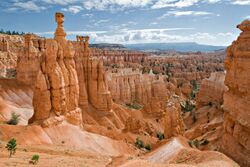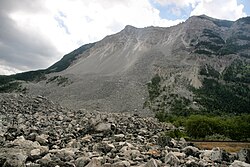Earth:Geomorphosite


A geomorphosite, or geomorphological heritage site, is a landform or an assemblage of landforms that have a scientific, educational, historic-cultural, aesthetic or socio-economic value.[2][3]

Geomorphosites are included among the geoheritage sites (geosites) and may comprise landforms (or sites of former landforms) that have been hidden or destroyed due to human activities,[5][6] as well as anthropogenic landforms[7][8] of archaeological or historical interest.[9]
The value of a geomorphosite, for purposes of analysis, comparison and protection, can be qualitatively assessed using several methods.[10] Some of these methods are based only on expert judgements and a few evaluation criteria, while others involve assigning a qualitative score to each relevant characteristic of a site (e.g. its scientific importance, educational value etc.) and then weighting and summing (or ranking) the scores to obtain the site's overall value (or rank).
References
- ↑ Del Monte, M.; Fredi, P.; et, al. (2013-12-30). "Geosites within Rome City center (Italy): a mixture of cultural and geomorphological heritage". Geografia Fisica e Dinamica Quaternaria 36 (2): 241–257. doi:10.4461/GFDQ.2013.36.20. ISSN 0391-9838. https://doi.org/10.4461/GFDQ.2013.36.20.
- ↑ Panizza, Mario (2001-01-01). "Geomorphosites: Concepts, methods and examples of geomorphological survey" (in en). Chinese Science Bulletin 46 (1): 4–5. doi:10.1007/BF03187227. ISSN 1861-9541. Bibcode: 2001ChSBu..46S...4P. https://doi.org/10.1007/BF03187227.
- ↑ Reynard, Emmanuel. "Geomorphosites: Definitions and characteristics". https://www.researchgate.net/publication/288265820.
- ↑ Morino, Costanza; Coratza, Paola; Soldati, Mauro (2022). "Landslides, a Key Landform in the Global Geological Heritage". Frontiers in Earth Science 10. doi:10.3389/feart.2022.864760. ISSN 2296-6463.
- ↑ Clivaz, Mélanie; Reynard, Emmanuel (2018-12-01). "How to Integrate Invisible Geomorphosites in an Inventory: a Case Study in the Rhone River Valley (Switzerland)" (in en). Geoheritage 10 (4): 527–541. doi:10.1007/s12371-017-0222-7. ISSN 1867-2485. https://doi.org/10.1007/s12371-017-0222-7.
- ↑ Pica, Alessia; Luberti, Gian Marco; Vergari, Francesca; Fredi, Paola; Monte, Maurizio Del (2017-09-01). "Contribution for an Urban Geomorphoheritage Assessment Method: Proposal from Three Geomorphosites in Rome (Italy)" (in en). Quaestiones Geographicae 36 (3): 21–36. doi:10.1515/quageo-2017-0030. https://www.sciendo.com/article/10.1515/quageo-2017-0030.
- ↑ (in en) Anthropogenic Geomorphology. 2010. doi:10.1007/978-90-481-3058-0. ISBN 978-90-481-3057-3. https://link.springer.com/book/10.1007/978-90-481-3058-0.
- ↑ Howard, Jeffrey (2017), Howard, Jeffrey, ed., "Anthropogenic Landforms and Soil Parent Materials" (in en), Anthropogenic Soils, Progress in Soil Science (Cham: Springer International Publishing): pp. 25–51, doi:10.1007/978-3-319-54331-4_3, ISBN 978-3-319-54331-4, https://doi.org/10.1007/978-3-319-54331-4_3, retrieved 2022-08-14
- ↑ Filippo, Brandolini; Cremaschi, Mauro; Manuela, Pelfini (2019-12-01). "Estimating the Potential of Archaeo-historical Data in the Definition of Geomorphosites and Geo-educational Itineraries in the Central Po Plain (N Italy)" (in en). Geoheritage 11 (4): 1371–1396. doi:10.1007/s12371-019-00370-5. ISSN 1867-2485. https://doi.org/10.1007/s12371-019-00370-5.
- ↑ Mucivuna, Vanessa Costa; Reynard, Emmanuel; Garcia, Maria da Glória Motta (2019-12-01). "Geomorphosites Assessment Methods: Comparative Analysis and Typology" (in en). Geoheritage 11 (4): 1799–1815. doi:10.1007/s12371-019-00394-x. ISSN 1867-2485. https://doi.org/10.1007/s12371-019-00394-x.
Further reading
- Geographica Elvetica 62(3) (2007) [1]
- Geomorphologie 11(3) (2005) [2]
- Reynard E, Coratza P, Regolini – Bissig G (edd., 2009) Geomorphosites. Verlag Dr. Friedrich Pfeil, München
 |

